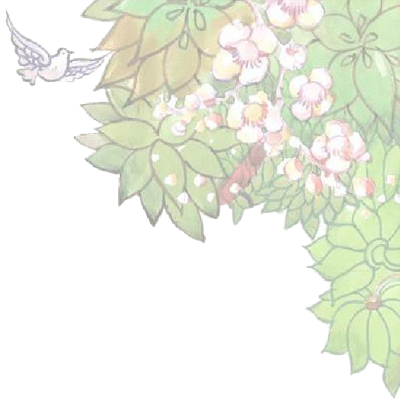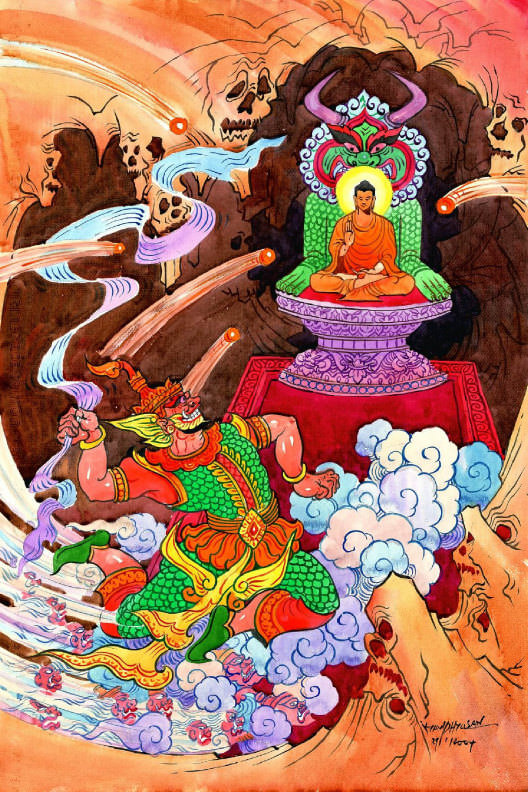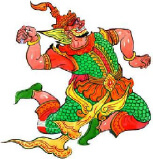49話 人食い鬼アーラヴァカ ・・・・ 最上の生き方とは?

第4部 ブッダをめぐる人々
第5章 在家信者への教え
49話 人食い鬼アーラヴァカ ・・・・ 最上の生き方とは?

世尊の十六回目の雨安居中、獰猛で敵意をもった人食い鬼のアーラヴァカ(曠野)夜叉に関して、重要な出来事があった。
アーラヴィー国は、アーラヴァカ王によって治められていた。王は軍の士気引き締めのため、週に一度、森で狩りをする遊びを習慣としていた。あるとき狩りをしていて、王が待ち伏せしているところから獲物が逃げた。弓をもっている王は、すぐさま鹿を追った。その鹿は三リーグ(約一四・四㌔)逃げたあと、池のほとりで、うずくまった。かくして王は、苦もなく鹿を殺し、二つに切り、棒につけて運んだ。
帰る途中、王はバニヤン樹の木陰でひと休みした。そのバニヤン樹は、アーラヴァカ夜叉の棲みかであった。アーラヴァカ夜叉は、夜叉の王である毘沙門天(ヴェッサヴァナ)(訳注:四天王の一、多聞天ともいう)から、願いを一つかなえてもらっていた。その願いとは、バニヤン樹の木陰に入ってきた者は誰でも食べてよい、というものだった。このため、夜叉は王を捕まえたのだが、王は夜叉が釈放してくれるなら人間ひとりと、ひと鉢の炊いた飯を毎日提供する、と約束したのである。
アーラヴァカ王は大臣たちに助けられ、囚人を夜叉に送って約束を果たすことができた。犠牲者がバニヤン樹の木陰に入るやいなや、夜叉は極めて異様なかたちになって、まるで球根状のふくらんだ根を食べるかのように囚人をガツガツ貪り喰らった。そして牢獄に囚人がひとりもいなくなったとき、王は各家からこどもひとりを生けにえとして夜叉へ差し出すようにさせた。
それから十二年後、アーラヴィー国には、もはや王自身の息子のアーラヴァカ・クマーラ以外、誰ひとりこどもがいなくなった。王はわが息子をたいへん愛していたが、自分より大切な者は誰もいない、と王はわかっていたので、自分が夜叉の生けにえになることができなかった。それゆえ王は、わが息子をたいへん豪華に着飾らせ、夜叉のもとへ連れて行った。
ある日の早朝、世尊がジェータヴァナ僧院(祇園精舎)の香房で、大悲定(マハーカルナー サマーパッティ)の至福に達し、そのなかにひたり、ブッダの眼(仏眼(ブッダチャック))で世界を探査されていたとき、アーラヴィー国で起きようとしていること、アーラヴァカ王子、アーラヴァカ夜叉、そして八万四千の生けるものが、さまざまな段階の真理(ダンマ)を覚り、どのようになり得るか、その可能性を見られた。
それから朝の務めを終えられた後、世尊は托鉢の鉢と外衣をもって、サーヴァッティ(舎衛城)から三十ヨージャナ(五百㌔前後)の距離のアーラヴィー国へ歩いて向かわれた。世尊は夕暮れに、アーラヴァカ夜叉の棲みかに到着した。そのときアーラヴァカ夜叉は、ヒマラヤ山で開いている夜叉の集会に行っていた。アーラヴァカ夜叉の門番のガドラバ(驢馬)夜叉が世尊に近づいてきてお辞儀し、こう尋ねた。
「尊師よ、こんな午後遅くに来られたのですか?」
「そうだ、ガドラバよ、わたしは来たのだ。もし、そなたに迷惑でなければ、アーラヴァカの棲みかで夜を過ごしたいのだが」
「尊師よ、わたしにとっては迷惑ではないのですが、アーラヴァカ夜叉は、獰猛で残忍である、とご承知ください。なにしろ自分の両親にすら敬意を払わないのですから。ですから世尊は、ここに滞在されてはなりません!」
「そうだ、ガドラバよ、わたしはアーラヴァカが獰猛で残忍な性質である、と承知している。わたしにはどのような危険もないのだ。だから、もし、そなたに迷惑でなければ、ここで夜を過ごしたい」
ふたたびガドラバは世尊に警告して、こういった。
「尊師よ、アーラヴァカは燃える坩堝のようなものです。誰でもどんなことでも、ないがしろにして無視するのです。かれの両親、比丘、バラモン、それに真理も。ここに来る者には狂暴になり、心臓を引き裂き、足をつかんで大海のかなたへ、あるいは世界のかなたまで、放り投げるのです」
そこでふたたび、世尊がいわれた。
「そうだ、ガドラバよ、わたしはそれを全部承知している。しかし、もし、そなたに迷惑でなければ、わたしはここで夜を過ごしたい」
三たびガドラバは世尊に、滞在を思いとどまらせようとした。するとまた三たび、世尊は願いを撤回しなかった。このためガドラバは、こういった。
「尊師よ、わたしにとっては迷惑ではないのですが、アーラヴァカの許可なくわたしが滞在を認めてしまいますと、アーラヴァカはわたしを殺すかもしれません。ですから尊師よ、わたしはこの件でかれのもとへ行って、話してみましょう」
「ガドラバよ、そなたがそうしたいなら、行って話してもよい」
「尊師よ、この件の場合、あなたさまに何が起きようとも、あなたさまだけに責任があるのでございますからね」
このように言ってから、ガドラバは世尊にお辞儀して、ヒマラヤ山へ向かって立ち去った。
世尊はアーラヴァカの棲みかに入られ、かれの宝石玉座に坐られた。世尊は御身体から、あらゆる方向へ金の光輪を放射された。これを見て、アーラヴァカのお付きの女性たちが周りに集まってきて、世尊に礼拝した。世尊はさまざまな法話をされ、布施すること、道徳をまもること、心を集中すること、の利益について、彼女たちに意欲を吹き込まれた。魅力ある説法を聞かされて、彼女たちは強い畏敬の念をもって世尊の周りに坐っていた。
一方、ヒマラヤ山に到着したガドラバは、アーラヴァカの棲みかに世尊が出現されたことを伝えた。アーラヴァカの心はいっきに熱くなり、ガドラバに、静かにしていろ、というしぐさをした。必要な行動をとるためアーラヴァカは、ただちに帰ろうとしたのである。
さて、サーターギラ(七岳)とヘーマヴァタ(雪山)という高貴なふたりの夜叉がいた。かれらは会合へ行く途上で、空中を通り過ぎようとしていたが、世尊が地上にいるせいで飛べなくなり、その存在に気づいた。そこでアーラヴァカの棲みかに降下して、空の旅を続ける前に世尊に礼拝しようとしたのである。棲みかに着くなりサーターギラとヘーマヴァタは、アーラヴァカに、こう告げた。
(訳注:サーターギラとヘーマヴァタはいずれも夜叉の王。カッサパ仏の当時、比丘だったが、戒律を破り、輪廻転生でヒマラヤ山に夜叉として再生。初転法輪直後のブッダに出会い、帰依した)
「友アーラヴァカよ、そなたはなんと幸運か! 世尊がそなたの棲みかに来られて、そこにまだ坐っていらっしゃる。さあ、友アーラヴァカよ、世尊のお世話をしなさい!」
アーラヴァカは、こう言われて喜ぶどころか、激怒した。友ふたりの世尊をほめたたえる声をきいて、燃えるような大きな怒りの炎に胸を灼かれた。それから席を立って、こう叫んだ。
「あなたらの師のブッダがもっと強いというのか? もっと強いのは、おれの方ではないか? さあ、あなたらはいま、見るであろう!」
抑えられない怒りをこめて、自分の名前を大声で、誇らしく名乗った。
「おれがアーラヴァカだ!」
そして急いで自分の棲みかに戻った。
九種類の「死の雨」で連続攻撃
アーラヴァカ夜叉は、九種類の殺傷武器で、世尊に対して続けざまに攻撃した。最初に、周辺の町や村をそっくり根こそぎにできる猛烈な大竜巻(ヴァータマンダラン)を起こした。しかし、それが世尊のもとへ近づいてくると、世尊の衣の裾の端すら揺らすことができなかった。
自分の武器がまったく効果がなかったのを見て、アーラヴァカはいっそう怒り狂い、大豪雨(マハーヴァッサン)を降らせた。地上を浸食して穴をうがち、地面を水びたしにして、世尊を溺れさせるための大豪雨である。ところが、このひどい雨も、極めてちいさい露のしずくに変わってしまい、地上に落ちる前に蒸発した。
激しい怒りの真っただ中で、アーラヴァカは、何千もの炎上する火の玉の(パーサーナ)大岩の雨(ヴァッサン)を降らせた。だが、世尊にふれようとする前に、火の玉の大岩は姿を変え、天上のかぐわしい花かざりになった。いまだ世尊を追いたてることもできず、凶暴になったアーラヴァカは攻撃を続け、強烈な凶器の雨(パハラナヴァッサン)を次々に降りそそいだ。たとえば数々の剣や槍、鉈、ナイフ、矢などだ。しかし、それらはただ、色とりどりの天の花々にかたちを変えて落ちたのである。
またしてもアーラヴァカの試みは失敗した。だがそのとき、アーラヴァカは熾った炭火の雨(アンガーラヴァッサン)を世尊にたたきつけた。しかし、それらもまた、色とりどりのかぐわしい天の花々にかたちが変わったのである。アーラヴァカは執拗に世尊を攻撃し続けた。空からたいへん熱い、かたまりの火のような灰の雨(クックラヴァッサン)を降りそそいだ。しかし、それらは香りのよい白檀(びゃくだん)の粉末に変わった。まるで世尊を崇拝するかのようであった。
さらに、アーラヴァカは、空から熱砂の雨(ヴァーリカヴァッサン)を降らせた。しかし、それらはちいさな天の花々になった。次に、アーラヴァカは、空から焼けた泥の雨(カララヴァッサン)を降りそそいだ。しかし、それらは天のかぐわしい泥膏(でいこう)に変わった。
八種類の雨を降らせて失敗したので、アーラヴァカは戦慄した。それにもかかわらず、「暗黒(アンダカーラン)」という九番目の武器でアーラヴァカは攻撃を強行した。アーラヴァカの棲みかの周りを真っ暗闇にしたのである。しかし、世尊が近づいて姿を見せられると、それは消え去った。ちょうど暗闇が日光で破られるかのようであった。
アーラヴァカは、かれの九つの致死の雨がすべて無効で、世尊を玉座から追っ払えない、と判明して、衝撃を受けた。だが、引き続いてアーラヴァカは、さまざまな姿をした恐怖の妖怪変化からなる四部隊を率い、世尊に向かって進軍した。アーラヴァカとかれの大軍勢は半夜にわたって世尊を攻撃した。とはいえ、それは恐れ知らずに世尊に接近する、ということのない攻撃であった。
何度も攻撃に失敗したアーラヴァカは、かれの最も破壊力ある武器を繰り出すことに決めた。神聖な「白マント(ドゥッサーヴダ)」である。アーラヴァカは世尊の周囲に舞い上がり、駆けめぐって、世尊に向けてそれをたたきつけた。インドラ神(訳注:インドラ神は雷や暴風雨をつかさどる軍神)の雷鳴のように、空中でものすごい音が鳴り響いた。
あたり一面に煙と燃えあがる炎が噴き出た。マントは世尊に向かって飛んだ。 しかし、世尊にふれる前に足ふきのぼろ雑巾に変わって、世尊の足もとに落ちた。天界で生けるものたちがこの戦闘を見物するために集まっていたが、大声をあげて喝采した。おかげでアーラヴァカは、すっかり自尊心を失った気になった。
そこでアーラヴァカは、なぜ世尊が無敵で打ち負かせないのか、つくづく考えた。それは世尊の慈しみ(メッター)の力によるのだ、と思い至った。もし、アーラヴァカが世尊を怒らせ、自制心を失わせたら、そのときだけ打ち倒すことができる、とアーラヴァカは考えた。よってアーラヴァカは世尊に近づき、このように命令した。
「出て行け、比丘よ!」
世尊はアーラヴァカの命令を受け入れ、 「よろしい、友よ」と、喜んで答えて、出て行った。
「入れ、比丘よ!」と、アーラヴァカが命令した。世尊は「よろしい、友よ」と、また、入って行った。
アーラヴァカは、こう考えた。
(うーん、ゴータマ比丘に命令を下すのは、とてもかんたんだな。だが、なぜ、わしはひと晩中、世尊と戦うべきなのだろうか? いやまあ、わしはこんなふうにひと晩中やって、世尊を疲れてへとへとにさせてやろう。そうしたらその後に、世尊を放り出してやろう)
このように考えると、アーラヴァカの気持ちは穏やかになり始めた。そこで世尊に、二度目の命令を与えた。
「出て行け、比丘よ!」
世尊は「よろしい、友よ」と、答えながら、出て行った。
「入れ、比丘よ!」と、アーラヴァカがふたたび命令した。
「よろしい、友よ」と、世尊はふたたび入って行った。
さらに、アーラヴァカの三度目の命令にも世尊は逆らわずに出て行き、そして、入られた。
世尊は、敵意は敵意によっては静まらず、穏やかさによって静まる、という当然の現象を理解されていた。ちょうど泣きわめく腕白なちびっ子が、願いがみたされると静かになるようなものである。まして世尊は、忍耐強く辛抱して夜叉の命令に応じ、夜叉をおとなしくさせたのである。そして事実、アーラヴァカの気持ちは、次第に穏やかになった。
それからアーラヴァカがまた「出てこい、比丘よ!」と、四度目の命令をすると、世尊は「友よ、わたしは出て行かない。そなたは好きなことをするがよい」と、答えられた。
アーラヴァカの八つの質問
「おお、大物比丘のゴータマよ、わしはいくつか、おまえに質問しよう。もし、おまえが質問に完全に答えられないなら、わしはおまえの心をかき乱し、おまえの心臓をひき裂き、おまえの両足をつかんでガンジス川の向こう岸へ放り投げてやるぞ」
アーラヴァカの両親は、崇拝していたカッサパ仏から八つの質問とその答えを教わっていた。両親は、そのすべてをアーラヴァカが幼いころに教えた。それから時が過ぎ、アーラヴァカは答えを忘れたのだが、質問は黄金の板に赤い塗料で書き残し、棲みかにしまって保存しておいたのである。
(訳注:カッサパ仏とは、ゴータマ仏以前にこの世に現れた「過去七仏」のうちの一つで、ゴータマ仏の一つ前。漢訳では迦葉(かしょう)仏)
世尊がいわれた。
「友のアーラヴァカよ、神々、悪魔、梵天といった天界、そして行者、バラモン、王、庶民といった人間界を含むすべての世界にわたって、わが心を乱し、わが心臓を裂き、わが両足をつかんでガンジス川の向こう岸へ放り投げられるような者を、わたしは見いださない。しかしながら友よ、そなたがききたいことは何でもきいてよい」
そこでアーラヴァカは、世尊に偈で質問した。
“この世でいちばん賞賛に値する人間の最上の富とは何か?
どんなことを、いつ、善く実践すれば幸福をもたらすのか?
味の中でまさに最上の美味とは何か?
どのように生きるのが最も高貴な生活とみなされるのか?”
世尊は偈で答えられた。
“信(saddhā(サッダー))が、この世でいちばん賞賛に値する人間の最上の富である。
健全な道の行為・真理(dhamma(ダンマ))を、善く実践すれば幸福をもたらす。
真実(sacca(サッチャ))こそ、まさに最上の美味である。
智慧によって生きること(paññājīviṃ(パンニャージーヴィン))が、最も高貴な生活とみなされる”
世尊の答えを聞いて、アーラヴァカはたいへんうれしくなった。つづけて残りの四つの質問を偈できいた。
“ひとはいかにして暴流(ぼる)(激流)を渡るのか?
ひとはいかにして大海を渡るのか?
ひとはいかにして苦を乗り越えるのか?
ひとはいかにして全く清らかになるのか?”
世尊は偈で答えられた。
“信(saddhā(サッダー))によって、ひとは暴流(欲、有、見、無明)を渡る。
不放逸(appamāda(アッパマーダ))によって、ひとは大海(saṃsāra(サンサーラ)-輪廻転生)を渡る。
正精進(viriya(ヴィリヤ))によって、ひとは苦を乗り越える。
智慧(paññā(パンニャー))によって、ひとは全く清らかになる”
これらの答えの終わりには、アーラヴァカは預流果(ソーターパッティ パラ)に達した。かくて血に飢え、残虐で知られたアーラヴァカは、剣や笞、棍棒ではなく、世尊の無比の自己抑制から生まれる忍耐強い辛抱をとおして攻略されたのである。
この後すぐ、「智慧(paññā(パンニャー))」という言葉に感銘を受けたアーラヴァカは、さらに質問することを望んだ。
“いかにして智慧は得られるか?
いかにして富を獲得するか?
いかにして名声を得るか?
いかにして友だちができるのか?
どうすれば、亡くなってこの世からあの世へ逝った後に、悲しみ嘆かないか?”
世尊は、次のように、いくぶん精妙な答えをされた。
「涅槃(Nibbāna(ニッバーナ))にみちびく正等覚者の説く真理(dhamma(ダンマ))に確かな信(saddhā(サッダー))をもつ者は、賢者に耳を傾ける恭敬聴聞者(sussūsaṃ(スッスーサン))であり、気づきある不放逸な者(appamatta(アッパマッタ))であり、明察ある者(vicakkhaṇa(ヴィチャッカナ))であって、智慧(paññā(パンニャー))を得る。真っ当に、忍耐強く、活発に、ことをなす者は、財(dhana(ダナ))を獲得する。うそを言わない誠実さで、名声(kitti(キッティ))を得る。そして布施する寛大さで、友だち(mitta(ミッタ))ができる。確かな信がある在家者は、真実(sacca(サッチャ))、真理(dhamma(ダンマ))、堅固(dhiti(ディティ))、布施(cāga(チャーガ))というこれら四つの精神的資質があれば、あの世へ逝った後にも、悲しみ嘆かない(peccanasocati(ペッチャナ ソーチャティ)」
そしてまた、アーラヴァカの精神的満足のために、世尊はもっと質問するようにと、こういって促された。
「さあ、きいてみなさい! ほかの多くの行者、バラモンに、もしもこの世に、真実(sacca(サッチャ))、自制(dama(ダマ))、布施(cāga(チャーガ))、忍耐(khanti(カンティ))より偉大なものが、何かあるのかどうかを!」
夜叉は、思いきった大胆な答えをした。
「なぜ、わたしが、ほかの多くの行者、バラモンにきかなければならないのでしょうか? まさに、きょう、わたしは個人的に、来世に属するほんとうの幸福を覚ったのですから」
「まさしく、わたし自身のために、覚者はアーラヴィー市に来られたのでございます。そして、きょう、わたしみずから、どこへ布施すれば大きな果報となるのか、を覚ったのです」
そして、自分の幸福を育てる方法を得て、いまやアーラヴァカは、他者の幸福のために務めると、きちんと表明した。
「このため、村から村へ、町から町へ、わたしは遍歴遊行して、正自覚者と無上の教えと聖なる僧団(仏法僧)に敬礼(きょうらい)するでありましょう」
夜明けに、アーラヴァカ王の使者は、ちいさな王子のアーラヴァカ・クマーラを夜叉に生けにえとして献げた。アーラヴァカ夜叉はすでに預流者になっていたので、たいへん恥ずかしく思った。アーラヴァカ夜叉はちいさな王子を両手で持って、世尊に手渡した。世尊は王子を祝福し、王の使者に返した。かくて、この出来事によって、王子は「手の(ハッタカ)アーラヴァカ」として知られている。
※ 画像やテキストの無断使用はご遠慮ください。/ All rights reserved.

Episode 49 Ālavaka, THE FEROCIOUS OGRE
In the Blessed One’s sixteenth rains-residence, there was an important event concerning the conversion of Āḷavaka, a fiercely hostile ogre (yakkha).
The kingdom of Āḷavī was governed by King Āḷavaka. The king had a habit of holding pleasurable hunting in a forest once a week to keep his army in trim. One day when he was hunting, the quarry escaped from where the king laid in wait; according to the custom, it became the king’s duty to capture it. The king, equipped with a bow, immediately followed the deer. Having run for three leagues, the deer was lying
exhausted by a pond; thus the king easily killed it and cut it into two pieces and carried it with a pole.
On his way back, he took a rest under a shady banyan tree which was the abode of the yakkha Āḷavaka. The yakkha had been granted a boon by Vessavana, king of yakkhas; the boon allowed him to eat anybody who came within the shadow of the tree. Accordingly, he seized the king, but when the king made a promise to him that he would provide a man and a pot of cooked rice every day, Āḷavaka released him.
King Āḷavaka, with the help of his ministers, was able to keep his promise by sending criminals to the yakkha. As soon as the victim was in the shade of the banyan tree, the yakkha would assume a very frightful frame and devoure him as though he were eating a bulbous root. And when there were no more criminals in the prison, the king forced each household to contribute one child for the sacrifice to the yakkha.
Then, after twelve years, there were no more children in Āḷavī but the king’s own son, Āḷavaka Kumāra. Although the king loved his son very much, but he knew no one in this world dearer to him than himself; he could not sacrifice himself to the yakkha. Thereupon, he had his son dressed in all splendour and taken to the yakkha.
One day in the early morning, when the Blessed One was engaged in the attainment of the bliss of Boundless Compassion (Mahā Karuṇā Samāpatti) in his Fragrant Chamber in the Jetavana Monastery and when He was surveying the world with His Buddha-Eye (Buddhacakkhu), He saw what was going to happen in Āḷavī and the potentiality of Prince Āḷavaka, the yakkha Āḷavaka and eighty-four thousand beings to realise the Dhamma in various stage.
Then after His morning duty, the Blessed One took His bowl and robe and set out alone for Āḷavī—thirty yojanas away from Sāvatthi—on foot. He arrived at the abode of Āḷavaka at dusk when he was away at a meeting of yakkhas in Himavanta. His door keeper, the yakkha Gadrabha, approached the Blessed One, paid his respect, and asked: “Venerable sir, have you come at this late afternoon?”
“Yes, Gadrabha, I have come. If it were not burdensome to you, I would like to spend the night in Āḷavaka’s abode.”
“Venerable sir, it is not burdensome to me, but be informed that this yakkha is fierce and cruel; he does not show respect even to his own parents. Therefore, let the Blessed One not stay here!”
“Yes, Gadrabha, I know Āḷavaka’s fierce and cruel temperament. There would not be any danger to Me. So, if it were not burdensome to you, I would like to spend the night here.”
For the second time, Gadrabha warned the Blessed One, saying:
“Venerable sir, Āḷavaka is like a burning-iron pot. He ignores everyone and everything: his own parents, bhikkhus, brahmins or the Dhamma. He can drive mad those who come here; he can split open their hearts, or hurl them into the ocean beyond, or even into the world beyond, by seizing their feet.”
And for the second time, the Blessed One said: “Yes, Gadrabha, I know all this. But if it were not burdersome to you, I would like to spend the night here.”
For the third time, Gadrabha tried to discourage the Blessed One from staying. And again for the third time, the Blessed One did not retreat His wish. On account of this, Gadrabha said: “Venerable sir, it is not burdensome to me, but Āḷavaka might kill me if I allow You to stay here without his permission. Therefore, Venerable sir, I shall go and tell him about this matter.”
“Gadrabha, you may go and tell him as you like.”
“Venerable sir, in this case You alone are responsible for whatever might happen to Yourself.” Having said thus, Gadrabha saluted the Blessed One and departed to Himavanta.
The Blessed One entered the mansion and took His seat on Āḷavaka’s jewelled throne. He emanated a golden halo from His body to all directions. Seeing this, Āḷavaka’s female attendants gathered around and paid obeisance to Him. The Blessed One delivered a miscellaneous Dhamma talk, inspiring them with the benefits of giving alms, observing morality and developing concentration. Having heard the
sweet discourse, they remained sitting with great reverence, surrounding the Blessed One.
In the meantime, Gadrabha, who had arrived at Himavanta, informed the yakkha Āḷavaka about the arrival of the Blessed One in his mansion. His mind was instantly heated, and he made a gesture to Gadrabha to be quiet. He would go back immediately to take the necessary actions.
There were two noble yakkhas, Sātāgira and Hemavata, passing through
the air on their way to the congregation. They became aware of the Blessed One’s presence by their inability to fly over Him. They descended to Āḷavaka’s mansion and paid obeisance to the Blessed One before carrying on their journey. On their arrival, Sātāgira and Hemavata told Āḷavaka: “Friend Āḷavaka, how fortunate you are! The
Blessed One has come to your mansion and is still sitting there. Go, friend Āḷavaka, attend to the Blessed One!”
Instead of being happy, Āḷavaka became furious. His heart was burnt with great anger on hearing his two friends’ high praise of the Blessed One. Then, he got up from his seat and shouted: “Is your master, the Buddha, more powerful? Or, is it I who am more powerful? You shall see now!” And with an uncontrollable rage, he proudly
uttered his name aloud: “I am Āḷavaka!” and hurried back to his abode.
Yakkha Āḷavaka subsequently attacked the Blessed One with nine kinds of deadly weapons. First, he caused a devastating cyclone (vātamaṇḍalaṁ) capable of uprooting villages and towns in the surrounding area. But when it came near the Blessed One, it could not ruffle even the corner of His robe.
Seeing that his weapon had no effect, Āḷavaka became more furious and created a heavy torrential rain (mahāvassaṁ) which could abrade the earth into a crater, inundating the area and drowning the Blessed One. But, this terrible rain turned into minuscule dewdrops that evaporate even before they touched the ground.
In his mad fury, Āḷavaka rained down thousands of huge flaming boulders (pāsāṇavassaṁ). Before touching the Blessed One, they were transformed into fragrant celestial garlands. Still unable to flush out the Blessed One, the ferocious Āḷavaka continued his attack by pouring down rains of hot weapons (paharaṇavassaṁ), such as swords, javelins, machetes, knives, arrows, etc. But, they fell only in the form of manifold celestial flowers.
Once again, his effort failed. But then, Āḷavaka hurled down ablazed coals (aṅgāravassaṁ) onto the Blessed One; but, they, too, were transformed into sweet celestial flowers. Āḷavaka continued assailing the Blessed One; he poured down from the sky a mass of very hot, fire-like ashes (kukkuḷavassaṁ); but they turned into aromatic sandalwood powder, as if in adoration of the Blessed One.
Again, he created rains of hot sand (vālukāvassaṁ) down the sky; but they became a shower of tiny celestial flowers. Next, he poured down hot burning mud (kalalavassaṁ) from the sky; but they turned into celestial perfumed paste.
Having failed with his eight kinds of rains, Āḷavaka was shaken. Nevertheless, he pressed on with the ninth weapon called andhakāraṁ. He created deadly darkness to surround the abode; but on reaching the presence of the Blessed One it vanished just as darkness being eliminated by sunlight.
The yakkha was shocked that all his nine deadly rains proved to be ineffective and were unable to make the Blessed One flee from His seat. Subsequently, he marched towards the Blessed One by leading a fourfold frightening army consisting of various forms of ghosts armed with weapons. Āḷavaka and his hordes attacked the Blessed One for a half night without daring to go close to Him.
Having failed for many times, he decided to attack by launching his most devastating weapon, a divine white cloak (dussāvudha). While rising up around the Blessed One and roaming about, he hurled his weapon towards the Blessed One. It made a terrible sound in the sky like the thunderbolt weapon of Indra; it emitted smoke and burning flames all over. The cloak flew towards the Blessed One. But before touching Him, it turned into a foot-rag and dropped at the feet of the
Blessed One. Many celestial beings who assembled to see the fight roared their applause, while Āḷavaka felt he had utterly lost his pride.
Āḷavaka then reflected why the Blessed One was invincible. He came to know that it was due to His power of all-embracing loving-kindness (mettā). He thought if he could make the Blessed One angry and unforbearing, only then he could defeat Him. Accordingly, he approached the Blessed One and ordered: “Get out, you bhikkhu!” The Blessed One accepted his order and reply pleasantly: “Very well,
friend,” and went out.
“Come in, you bhikkhu!” Āḷavaka ordered. “Very well, friend,” the Blessed One entered again.
Āḷavaka thought: “Well, it is indeed very easy to command this bhikkhu Gotama. Why should I fight him for a whole night? Now, I will make him weary in this way for the whole night, and after that I will throw Him away.” Thus, Āḷavaka’s heart began to soften. So, he gave his second order to the Blessed One: “Get out, you bhikkhu!” The
Blessed One went out, saying: “Very well, friend.”
“Come in, you bhikkhu!” he ordered again. “Very well, friend,” the Blessed One entered again.
The Blessed One understood the natural phenomena that hostility could not be appeased by hostility, but by gentleness. Just as a naughty little child crying would be calm when his wish is fulfilled, even so the Blessed One with enduring patience tamed the yakkha by following his order. And in fact, Āḷavaka’s heart became more and more softened.
Then, when Āḷavaka ordered again for the fourth time: “Get out, you bhikkhu!” the Blessed One replied: “Friend, I shall not go out. You may do what you like.”
“O Great Bhikkhu Gotama, I am going to put some questions to You. If You cannot answer them thoroughly, I will make You mad, or cause the burst of Your heart, or hold You by the legs and throw You across the Gaṅgā River.”
The yakkha’s parents had learnt eight questions and answers from the Buddha Kassapa, whom they worshipped. They taught all these questions and answers to Āḷavaka when he was young. As time went by, Āḷavaka forgot the answers but he had written down the questions on a gold leaf with red paint, stored away in his mansion.
The Blessed One said: “Friend Āḷavaka, all over the worlds including the worlds of divine beings such as devas, māras and brahmās, and the world of human beings such as ascetics, brahmins, kings and commoners, I do not see anybody who could make Me mad, or cause the burst of My heart, or hold Me by the legs and throw Me across the Gaṅgā River. Nevertheless, friend, you may put whatever questions you like.”
Then Āḷavaka questioned the Blessed One in a verse:
“What is the most praiseworthy wealth of man in this world?
What, when well practised, brings happiness?
What indeed is the sweetest of tastes?
How is one’s life is considered the noblest life?”
The Blessed One replied in verse:
“Faith (saddhā) is the most praiseworthy wealth of man in this world.
Wholesome course of action (dhamma), when well practised, brings happiness.
Truth (sacca), indeed, is the sweetest of all tastes.
Living by wisdom (paññājīviṁ) is considered the noblest life.”
On hearing the answers given by the Blessed One, Āḷavaka became very
glad and continued asking the remaining four questions by uttering a
verse:
“How does one cross the flood?
How does one cross the ocean?
How does one overcome suffering?
How is one wholly purified?”
The Blessed One replied in verse:
“By faith (saddhā), one crosses the flood (of greed, wrong view and ignorance).
By vigilance (appamāda), one crosses the ocean (of saṁsāra—rebirth and death).
By right effort (viriya), one overcomes suffering (of worldly existence).
By wisdom (paññā), is one wholly purified.”
At the end of these questions and answers, Āḷavaka attained the
Fruition of Stream Entry (Sotāpatti Phala). Thus, Āḷavaka, who had
been known as fierce and blood-thirsty, was conquered not by sword,
stick or cudgel, but through enduring patience flowing from the
unequalled self-mastery of the Blessed One.
Thereupon, Āḷavaka, who was impressed by the word “wisdom” (paññā),
became desirous of asking further questions:
“How is wisdom gained?
How is wealth acquired?
How is fame attained?
How are friends won?
After passing away from this world to the next, how does one not grieve?”
The Blessed One gave somewhat elaborate answers, saying:
“He who has firm faith (saddhā) in the Dhamma of the Perfect One that
leads to Nibbāna, who pays attention to the wise (sussūsaṁ), who is
mindful and earnest (appamatta), and who has wise reflection
(vicakkhaṇa), gains wisdom (paññā). One, who does what is proper,
persevering and vigorous, acquires wealth (dhana). By truthfulness,
one attains fame (kitti). And by generosity, one wins friends (mitta).
The faithful householder, who is endowed with these four spiritual
qualities: truthfulness (sacca), righteousness (dhamma), courage
(dhiti) and generosity (cāga), does not grieve in the hereafter (pecca
na socati).”
And again, for Āḷavaka’s spiritual satisfaction the Blessed One urged
him to ask more, saying:
“Come on then! Ask many other ascetics and brahmins if there were anything in this world greater than these: truthfulness (sacca), self control (dama), generosity (cāga) and patience (khanti)!”
The yakkha gave his bold answer:
“Why should I ask many ascetics and brahmins? Indeed, today I come to know personally the real welfare I will gain belonging to the next world.”
“Verily, for my own good did the Enlightened One come to the City of Āḷavī. And today, I myself do know where gifts bestow the greatest fruit.”
And having acquired the means to develop his welfare, Āḷavaka now expressed his wish properly to do for the welfare of others:
“For this reason, from village to village and city to city will I wander forth honouring the Supremely Enlightened One, His Sublime Teachings and His Holy Order.”
At the dawn of the day, King Āḷavaka’s messengers offered the little Prince Āḷavaka Kumāra to the yakkha as sacrifice. As Āḷavaka had already become a Sotāpanna, he felt greatly ashamed. He tenderly took over the little prince with two hands and handed him over to the Blessed One. The Blessed One blessed the child and gave him back to the king’s messengers. Thus, because of this event, the prince was known as “Hatthaka Āḷavaka”.
※ 画像やテキストの無断使用はご遠慮ください。/ All rights reserved.
アシン・クサラダンマ長老
1966年11月21日、インドネシア中部のジャワ州テマングン生まれ。中国系インドネシア人。テマングンは近くに3000メートル級の山々が聳え、山々に囲まれた小さな町。世界遺産のボロブドゥール寺院やディエン高原など観光地にも2,3時間で行ける比較的涼しい土地という。インドネシア・バンドゥンのパラヤンガン大学経済学部(経営学専攻)卒業後、首都ジャカルタのプラセトエイヤ・モレヤ経済ビジネス・スクールで財政学を修め、修士号を取得して卒業後、2年弱、民間企業勤務。1998年インドネシア・テーラワーダ(上座)仏教サンガで沙弥出家し、見習い僧に。詳しく見る
奥田 昭則
1949年徳島県生まれ。日本テーラワーダ仏教協会会員。東京大学仏文科卒。毎日新聞記者として奈良、広島、神戸の各支局、大阪本社の社会部、学芸部、神戸支局編集委員などを経て大阪本社編集局編集委員。1982年の1年間米国の地方紙で研修遊学。2017年ミャンマーに渡り、比丘出家。詳しく見る

※ 画像やテキストの無断使用はご遠慮ください。
All rights reserved.

